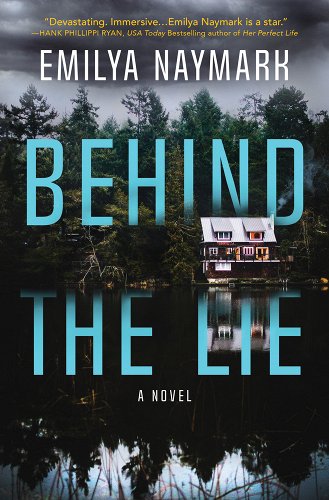Many of us have that one person for whom we are willing to sacrifice. Maybe it’s our child, a parent, a partner, a sibling. But most of us, living our law-abiding lives, would not break the law to protect that person. We would help. We might even wipe out our savings to do so, go into debt, give up a job or work one we hated, but that step from one side of the law to the other for someone else’s sake is difficult. Even impossible for many.
What makes these decisions in crime fiction so terribly compelling is we can, kinda, sorta, see how a person may be pushed to go over to the dark side. We might even, in an honest-hearted moment, relate to such a character.
In my novel, Behind the Lie, I became obsessed with the morality of crime. How easy would it be for a suburban wife and mother to justify committing it? And not in the heat of the moment, either. How would this kind, generous, upstanding woman explain it to herself? After all, when you have your family’s financial ruin on one side and bending the law on the other—what would you do?
Crime and thriller fiction overflows with vengeful and desperate mothers, women willing to go anywhere, do anything, to protect their children, their families from killers. Those decisions are instinctive and universal, and therefore relatable. We would not survive as a species without them.
But it’s the more subtle conundrums that stay with me long after I finish a book. In some of these novels, the decision was made years ago, and its dreadful consequences expand and fracture like a slow-motion grenade, until the characters meant to be protected are ripped to pieces.
In no particular order of excellence, these novels are examples of women going against their moral code—to the point of self-sacrifice—to protect those they love most.
MOTHERS FACING IMPOSSIBLE ODDS
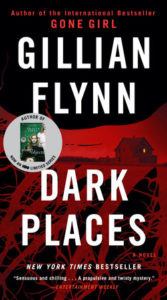
Dark Places by Gillian Flynn
On the surface, the story is that of Libby Day, a young woman whose two sisters and mother were brutally murdered twenty-four years earlier. Libby’s brother, Ben, was arrested and sentenced for these murders. As the novel begins, Libby is living a half-life. The money from well-wishers who had donated to her cause is almost gone, and she has no direction, no family, no connections with others. A group of true-crime detectives offers her a fee to come speak at their convention and she agrees.
When she delves into the details of that long-ago massacre, she begins to realize that the official story, and her memories, may not tell the full truth.
The part of this novel that has stayed with me for years is told from Libby’s mother’s point of view. A single mother of four, desperately trying to hang on to the family farm while her oldest son falls in with a bad crowd, she is, literally, looking down the barrel of a gun. The decision she makes is an unimaginably devastating one, but she makes it because it’s the only way she can see to take care of her children. And it’s this decision that blows everything to hell and begins the novel’s true story.
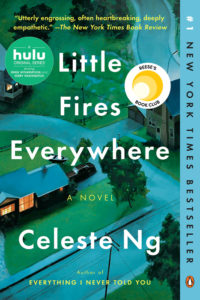
Little Fires Everywhere by Celeste Ng
In this deeply thought out and carefully plotted novel, two mothers who have built very different lives find themselves at opposite ends of an adoption case, which also pits two mothers against each other. Not one, but four women face moral dilemmas. Although not strictly in the crime or thriller genre, some characters stretch the law very thin, and others downright break it. Morality is the theme here, and whether motherhood is enough to weigh the scales to the shady side.

The Mother-in-Law by Sally Hepworth
When Lucy’s mother-in-law dies, the suicide note near her body blames cancer. However, her autopsy shows no cancer at all, but rather poison. Evidence of suffocation. And then there’s funny business with the will, which disinherits her two children and their families. As the novel explores family relationships and shows the investigation into what can only be murder, the mother-in-law’s story emerges.
Diana was not an easy or a simple person, and her own strict moral code governed her life from an early age.
As Diana watches over her grown children, she feels she has failed them. In a decision born less of desperation and more out of a desire to do the absolute best for her family, Diana sets in motion a series of events that destroy everything she’d pursued and built.
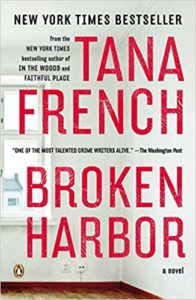
Broken Harbor by Tana French
I admit it, I can’t assemble a list without including Tana French. As with the other novels on this list, the women making the shattering decisions are off camera. And yet, it’s their decisions that influence everything that happens, from Detective Mick “Scorcher” Kennedy’s personal dilemmas and responsibilities, to the main crime of the story.
When someone brutally attacks a family in their own home in a half-built, mostly deserted housing development, only the mother, Jennifer, survives, albeit in critical condition. As Detective Kennedy investigates the horrible murders of the father and two small children, he finds resonance with his own past, and his own mother and younger sister. The murdered family had been facing crushing stress since the father lost his job. No income, no way to pay the bloated mortgage, no buyers for the house during a recession. Madness sets in. Jennifer, trapped between her husband’s increasingly deranged behavior and her family’s needs, takes a catastrophic step to set things to rights.
SISTERS IN CRISIS

My Sister, the Serial Killer by Oyinkan Braithwaite
Korede loves her beautiful younger sister Ayoola. They have a special bond that even their mother can’t touch, despite her obvious preference for the pretty, childlike Ayoola. In fact, everyone prefers Ayoola. Written by a Nigerian author and set in that country, this novel is not only a tight portrait of sisterhood, but a fascinating and refreshingly different portrayal of a society where women are measured by their looks and their ability to get—and keep—a man, above all other accomplishments. When the younger sister’s boyfriends turn up dead, Korede has a decision to make. Does she expose her sister to the authorities? Let her clean up her own mess? Or continue being the caretaker she’s always been for the younger girl at the cost of her own romantic dreams? The decision is not an easy one, but it resonates once it’s made. It was the only possible one for this character.

The Ruin by Dervla McTiernan
When Detective Cormac Reilly transfers from Dublin to Galway, he is assigned a cold case from twenty years ago—a case that happens to have been one of his first as a rookie. Coinciding with his transfer is an apparent suicide, a young man named Jack who had everything to live for. As Cormac digs into his case, he realizes Jack is the little boy he’d found all those years ago, along with his older sister, freezing and starved in the aftermath of their mother’s fatal overdose. Back then, he’d brought the two children to the hospital and hoped they’d be kept together when farmed out to foster homes.
He needn’t have worried. The sister, an adolescent herself, had vanished.
As the novel exposes details of the two cases, it becomes clear that the sister, although still a child, had been trying to care for her little brother against overwhelming odds. An alcoholic mother, an overburdened and indifferent school system, no money for food or clothes for her brother’s and her growing bodies. The heartbreaking decisions she made twenty years earlier boomeranged, leaving no one unscathed.
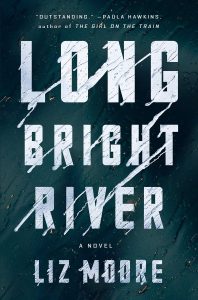
Long Bright River by Liz Moore
Mickey is a cop patrolling the working-class Philadelphia neighborhood where she and her younger sister, Kacey, grew up. Kacey, sometimes homeless, haunts the streets for other reasons as she battles drug addiction. Then she disappears, just as someone begins killing young sex workers in the same precinct.
As Mickey searches and searches the familiar streets and interviews people she’s known her entire life, a decision she’d made years ago is highlighted. As a reader, I believed in what she did and thought she’d made the choice I would have made. Maybe. Where this novel excels is in showing Mickey’s decision from several angles, shining a spotlight on belief systems that may or may not be flawed, convictions that may have grown out of motives not entirely selfless.
***
What makes these novels so affecting is the way the authors convey these women’s dilemmas. These are not fierce mama bears fighting monsters to save their families. These are women flattened by impossible pressures. Relating to the problems makes the characters sympathetic; the destruction caused by their decisions makes the stories riveting.


